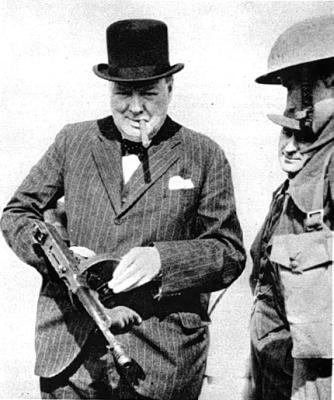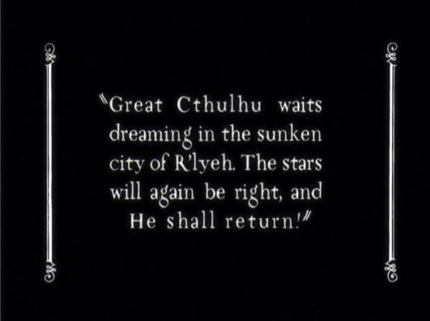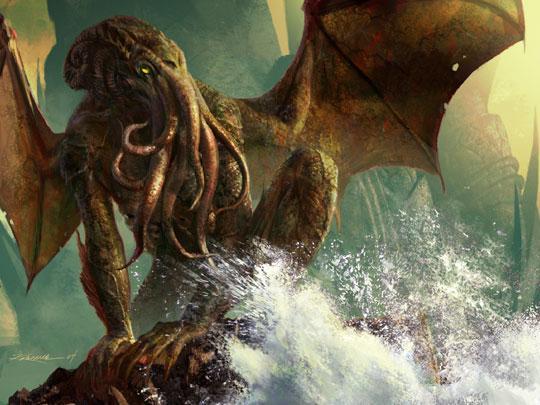R’lyeh’s Finest Hour?
Saturday, February 14, 2009
posted by Steve Tompkins
 Print This Post
Print This Post

Great Cthulhu just keeps coming up around here; the stars must be right or something. As in a 2007 post, I’m uncomfortably aware that for a JRRT/REH/KEW adherent like myself to delve into Lovecraftian lore is rather like de-planing at JFK after an international flight, clearing Customs, and then making a scene in the main concourse by announcing my discovery of America. Such a claim would be more likely to irritate than impress bystanders, because of how well and truly discovered the New World already is. Similarly, all those decades of Esoteric Order of Dagon-zines and Necro Press journals weigh on the upstart like “something frightfully suggestive of old and unhallowed cycles of life in which our world and our conceptions have no part.” Here I go, though.
Let’s turn to the deathless first paragraph of “The Call of Cthulhu,” about which S. T. Joshi and Peter Cannon have this to say in their More Annotated H. P. Lovecraft (1999): “Arguably the most famous passage in Lovecraft’s fiction, setting forth his view of man’s precarious and insignificant place in the cosmos. The opening sentence has been enshrined in the fifteenth edition of Bartlett’s Familiar Quotations (1980).”
Could it be that said passage’s third sentence has also been enshrined, in a setting more exalted than Bartlett’s? Let’s refresh our memories:
The sciences, each straining in its own direction, have hitherto harmed us little; but some day the piecing together of dissociated knowledge will open up such terrifying vistas of reality, and our frightful position therein, that we shall either go mad from the revelation or flee from the deadly light into the peace and safety of a new dark age.
Now let’s jump to the penultimate paragraph of Winston Churchill’s June 18, 1940 speech to the House of Commons. France is falling, Britain is reeling, and a lethal blight blackens the gardens of the West:
Hitler knows that he will have to break us in this Island or lose the war. If we can stand up to him, all Europe may be free and the life of the world may move forward into broad, sunlit uplands. But if we fail, then the whole world, including the United States, including all that we have known and cared for, will sink into the abyss of a new Dark Age made more sinister, and more protracted, by the lights of perverted science.
Now obviously Churchill need not have derived the notion of “a new Dark Age” from Lovecraft. For most of the 20th century (until 1989? 1991?), and especially between 1914 and 1945, another Dark Age was always just around the corner of the about-to-be-leveled edifice of Western civilization. Light-and-dark imagery is as much a part of our primate patrimony as opposable thumbs, among its many duties is that of default metaphor in Arthurian fiction (or modern epic fantasy) when Everything Is Endangered. Himself already an actor on the world-historical stage in 1914, Churchill is unlikely to have forgotten the August 3 comment of Sir Edward Grey, watching from a Whitehall window as the streetlights went on : “The lamps are going out all over Europe; we shall not see them lit again in our lifetime” — as a master wordsmith, he probably wished he’d thought of the line before Grey did.

Nor is the function of the new dark age the same in both passages. For Lovecraft, it affords the possibility of a blissfully ignorant sanctuary from the retina-and-mind-searing clarity of epistemological epiphany. A hiding-place wherein anthropocentrism can lick its wounds, rock itself to sleep. For Churchill, the backslide into barbarity is the worst that can happen, rather than a last desperate way of evading the worst. But isn’t it striking that both Lovecraft and Churchill assign science such a destructive role? The former imagines a “deadly light,” the latter, “the lights of perverted science.”
We’re probably dealing with nothing more than coincidence. And yet the half-American Churchill was an assiduous networker in the U. S. , a tireless maintainer of literary and journalistic connections from his first American lecture tour in 1900 until he was too old to write. He and Lovecraft have appeared in at least one book together, the Peter Glassman-edited Scary Stories: Lovecraft is represented by “The Terrible Old Man,” Churchill by “Man Overboard!” I don’t recall a reference to Weird Tales in the Churchill biographies by William Manchester or Martin Gilbert, but a pulp or three could have crossed his desk during the wilderness years. Nor should we forget T. Everett Harré’s 1929 anthology Beware After Dark!, which not only included “The Call of Cthulhu” but singled the story out for its “cumulative awesomeness and building of effect to its appalling finale.” And Messrs. Derleth and Wandrei published The Outsider and Others in 1939, when Churchill was not yet Prime Minister. What better “atonement” for Lovecraft, who was a little too intrigued by Hitler as a Kultur-defender during the demagogue/dictator’s initial notoriety, than to have helped inspire a call to arms that will ring out as long as English is spoken?

Note: The preceding paragraph of the same Churchill speech is detectable in Peter Jackson’s The Two Towers:
Churchill: What General Weygand called the Battle of France is over. I expect that the Battle of Britain is about to begin.
Gandalf: The battle for Helm’s Deep is over. The battle for Middle-Earth has begun.

